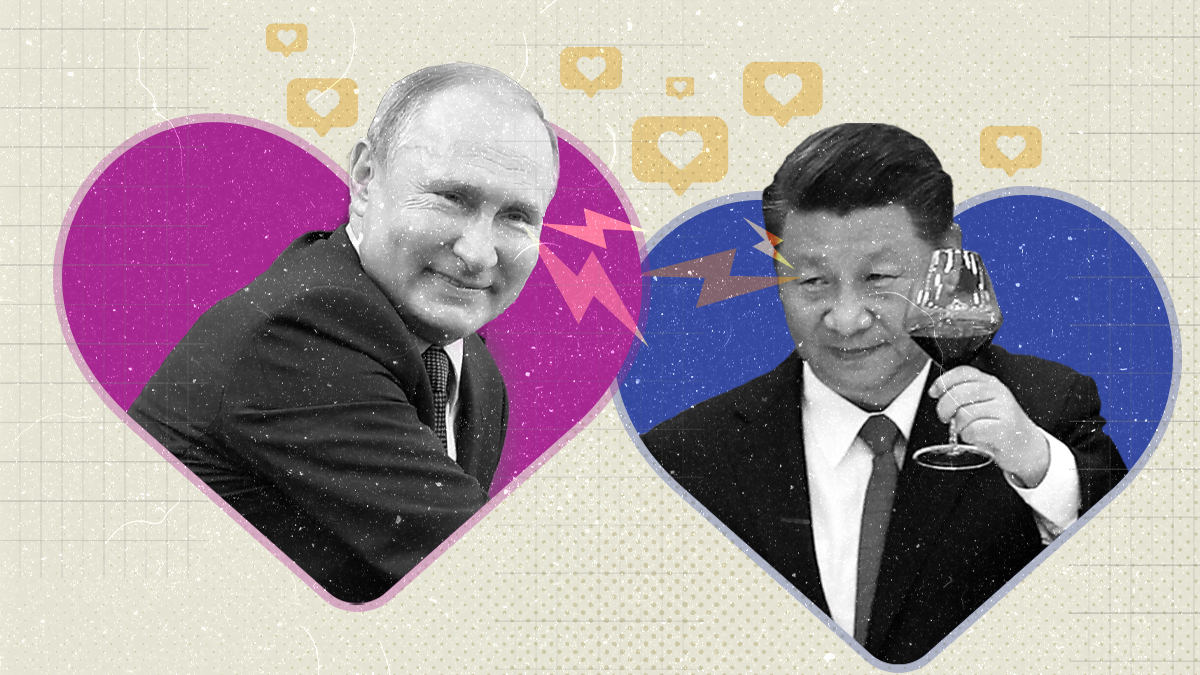The presidents of China and Russia will meet in person this week for the first time since early February, shortly before Russia invaded Ukraine. Back then, Xi Jinping and Vladimir Putin announced in Beijing a bilateral friendship "without limits." Seven months later, the relationship has strengthened but also seen trouble — and this is likely to continue.
Xi — on his first trip outside China since early 2020 — and Putin will hang out in the Uzbek city of Samarkand for the annual summit of the Shanghai Cooperation Organization, a China-led regional bloc initially set up to fight Islamic terrorism across Central Asia. But the agenda will mainly focus on Ukraine, common grievances with the West, and further deepening bilateral ties on things like a mammoth pipeline that’ll pump Russian natural gas to China via Mongolia.
When the famously stone-faced Xi and always-smirking Putin "smile" for their photo-op, they'll put on a brave face. The two want to appear as BFFs standing strong and tall against America and its allies — a bulwark of resistance to the US-led liberal international order that won't give them a fair shake. Their handshake will dominate state media in Beijing and Moscow, and it will raise the usual alarm bells in Washington.
In private, though, Xi is anything but pleased. We'll never know whether Putin told Xi in February he'd already decided to invade Ukraine, but China’s leader likely expected a swift campaign that wouldn't give the US or its NATO allies time to respond.
"Obviously, the war hasn't gone the way that Russia intended or the way that China expected," says Eurasia Group senior analyst Ali Wyne. The longer it drags on, and China stays non-committal about Russian aggression, the further it'll strain Beijing's already-fraught relationships with its top trading partners in the West.
What’s more, both Xi and Putin have a lot going on these days. Xi is freaking out about China's economy, which is in the doldrums thanks in no small part to his stubborn refusal to relax the zero-COVID policy. Hardly the rosy outlook he was hoping for just one month before the 20th Communist Party Congress, where Xi will get a norm-defying third term as CCP secretary-general.
Putin, for his part, is losing Russian-held territory to the Ukrainian counteroffensive, bracing for a G7 cap on the price of Russian oil, and facing rare internal pushback. The "special military operation" is not going according to plan — to the point that Putin might soon need to admit it's actually a "war".
Personality matters, too. Like classic Bond villains, the two autocrats would rather jump out a window than admit to being wrong and reverse course for fear of appearing weak or losing face with their people. This rigidity extends to foreign policy, where Wyne says that Xi has boxed himself in with Taiwan much as Putin has with Ukraine.
Xi might not be happy with the current state of the relationship, but he knows that China and Russia now need each other more than they have in decades. And while Putin is a lot needier — especially to sell Russian oil and gas in roubles and yuan — Xi has invested so much politically in their bromance that China is stuck in a toxic relationship it can’t escape.
So, how might the China-Russia friendship evolve in the near future? Expect it to get stronger but even more complicated, since Beijing and Moscow are as nervous about Western opposition as they are suspicious of each other.
For instance, Russia frets about China's growing security clout among the Central Asian republics, part of the former Soviet sphere of influence. Interestingly, the Xi-Putin meeting is taking place in Uzbekistan, one of the ‘Stans that Wyne says is getting cold feet about dealing with Moscow after witnessing Russia's brutality in Ukraine. Putin has responded to Beijing's charm offensive by reaching out to India, China's strategic rival and eager to play a bigger role in Central Asia.
Still, Xi and Putin will continue going steady because neither can afford to part ways with the other.
"China is wary of throwing Russia under the bus," says Wyne. If Beijing abandons Moscow, it really has no on other major powers to turn to. "That scares China," which is doubling down on the Russian friendship out of anxiety, not confidence.
